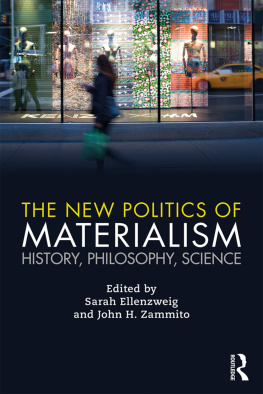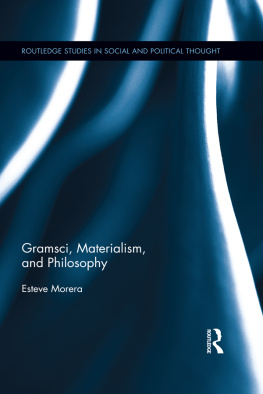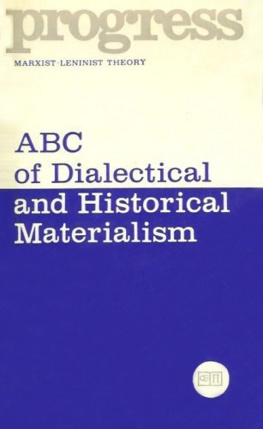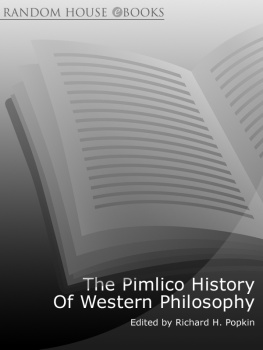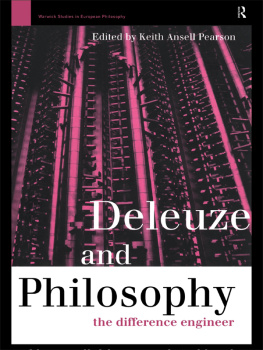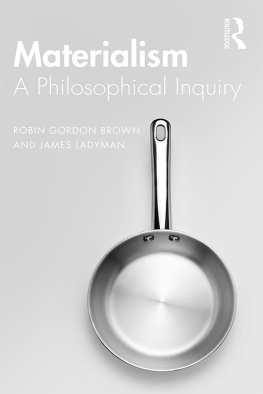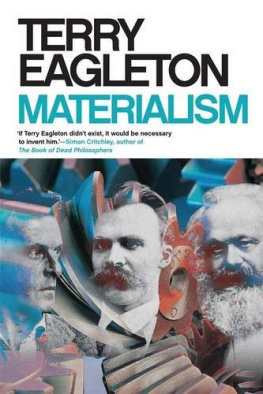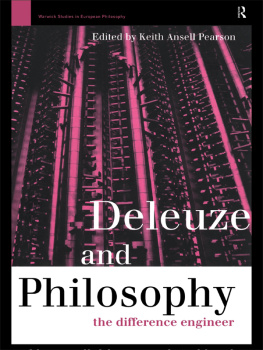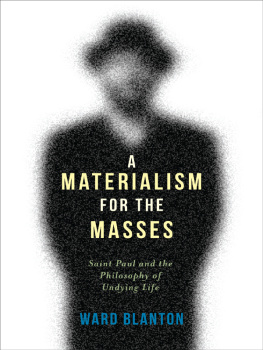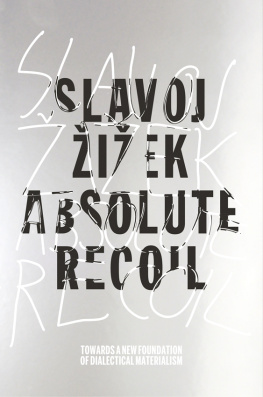The New Politics of Materialism
New materialism challenges the mechanistic models characteristic of early modern philosophy that regarded matter as largely passive and inert. Instead it gives weight to topics often overlooked in such accounts: agency, vitalism, complexity, contingency, and self-organization.
This collection, which includes an international roster of contributors from philosophy, history, literature, and science, is the first to ask what is new about the new materialism and place it in interdisciplinary perspective. Against current theories of new materialism it argues for a deeper engagement with materialisms history, questions whether matter can be lively, and asks whether new materialisms wish to revitalize politics and the political lives up to its promise.
Contributors: Keith Ansell-Pearson, Sarah Ellenzweig, Christian J. Emden, N. Katherine Hayles, Jess Keiser, Mogens Lrke, Ian Lowrie, Lenny Moss,Angela Willey, Catherine Wilson, Charles T. Wolfe, Derek Woods, and John H. Zammito.
The New Politics of Materialism
History, Philosophy, Science
Edited by Sarah Ellenzweigand John H. Zammito

First published 2017
by Routledge
2 Park Square, Milton Park, Abingdon, Oxon, OX14 4RN
and by Routledge
711 Third Avenue, New York City, NY 10017
Routledge is an imprint of the Taylor & Francis Group, an informa business
2017 selection and editorial matter, Sarah Ellenzweig and John H. Zammito; individual chapters, the contributors
The right of Sarah Ellenzweig and John H. Zammito to be identified as the authors of the editorial material, and of the authors for their individual chapters, has been asserted in accordance with sections 77 and 78 of the Copyright, Designs and Patents Act 1988.
All rights reserved. No part of this book may be reprinted or reproduced or utilised in any form or by any electronic, mechanical, or other means, now known or hereafter invented, including photocopying and recording, or in any information storage or retrieval system, without permission in writing from the publishers.
Trademark notice : Product or corporate names may be trademarks or registered trademarks, and are used only for identification and explanation without intent to infringe.
British Library Cataloguing in Publication Data
A catalogue record for this book is available from the British Library
Library of Congress Cataloging in Publication Data
A catalog record has been requested for this book
ISBN: 978-1-138-24074-2(hbk)
ISBN: 978-1-315-26847-7(ebk)
Contents
SARAH ELLENZWEIG AND JOHN H. ZAMMITO
SARAH ELLENZWEIG
CHARLES T. WOLFE
JES KEISER
KEITH ANSEL-PEARSON
CATHERINE WILSON
ANGELA WILLEY
IAN LOWRIE
N. KATHERINE HAYLES
DEREK WOODS
LENNY MOSS
MOGENS LRKE
CHRISTIAN J. EMDEN
JOHN H. ZAMMITO
Keith Ansell-Pearson holds a Personal Chair in Philosophy at the University of Warwick, England, a position he has held since 1998. He is the author of close to 100 essays in journals and edited book collections. His books include Nietzsche contra Rousseau (Cambridge University Press, 1991/1994), Germinal Life: The Difference and Repetition of Deleuze (Routledge, 1999), Bergson and the Time of Life (Routledge, 2002), and Thinking Beyond the Human Condition with Bergson (Bloomsbury, 2017). He is also the editor of Bergson: Key Writings (Bloomsbury, 2006, 2014), A Companion to Nietzsche (Blackwell, 2006), and The Nietzsche Reader (Blackwell, 2006). He is currently researching a book on ethics and the art of life in Nietzsche, Foucault, and Deleuze.
Sarah Ellenzweig is Associate Professor in the Department of English at Rice University. She is author of The Fringes of Belief: English Literature, Ancient Heresy, and the Politics of Freethinking, 1660 1760 (Stanford University Press, 2008). She has published essays in ELH , Journal of the History of Ideas , Journal of British Studies , and MLQ . Her recent work on the history of materialism and the philosophy of motion appears in edited volumes from Oxford University Press and University of Toronto Press. She is currently working on a book on the philosophy of motion and the rise of the novel in the eighteenth century.
Christian J. Emden is Co-Director of the Program in Law, Politics & Social Thought and Professor in the Department of Classical and European Studies at Rice University, where he teaches modern intellectual history and political thought. He is the author of four books, most recently Nietzsches Naturalism: Philosophy and the Life Sciences in the Nineteenth Century (Cambridge University Press, 2014) and Friedrich Nietzsche and the Politics of History (Cambridge University Press, 2008). He also edited, with David Midgley, Beyond Habermas: Democracy, Knowledge, and the Public Sphere (Berghahn Books, 2012) and Changing Perceptions of the Public Sphere (Berghahn Books, 2012). Emden is currently working on three projects: one on normativity and philosophical naturalism, the second on political realism in the work of Max Weber and Hannah Arendt, and the third on political citizenship in a postnational world.
N. Katherine Hayles is the James B. Duke Professor of Literature at Duke University. She teaches and writes on the relations of literature, science, and technology in the twentieth and twenty-first centuries. Her book How We Became Posthuman (University of Chicago Press, 1999) won the Ren Wellek Prize for the Best Book in Literary Theory in 1998/9, and her book Writing Machines (MIT Press, 2002) won the Suzanne Langer Award for Outstanding Scholarship. Her most recent book is entitled Unthought : The Power of the Cognitive Nonconscious (University of Chicago Press, 2017).
Jess Keiser is Assistant Professor of English at Tufts University. He has published essays on early modern materialism, satire, and madness. His current book project, Nervous Fictions , examines the use of figurative language in seventeenth- and eighteenth-century descriptions of the brain; portions have appeared in Modern Philology and English Literary History .
Mogens Lrke is a permanent researcher at the Centre National de la Recherche Scientifique (CNRS) in France with an affiliation at the cole Normale Suprieure de Lyon. He is the author of Leibniz Lecteur de Spinoza. La Gense dune Opposition Complexe (Champion, 2008) and Les Lumires de Leibniz. Controverses avec Huet, Bayle, Regis et More (Classiques Garnier, 2015). He is the editor of The Use of Censorship in the Enlightenment (Brill, 2009) and co-editor of The Philosophy of the Young Leibniz (Franz Steiner Verlag, 2009), Spinoza/Leibniz: Rencontres, Controverses, Rceptions (Presses Universitaires de Paris Sorbonne, 2015), and Philosophy and Its History (Oxford University Press, 2015). He is the author of more than fifty articles and book chapters on a variety of issues in early modern philosophy.
Ian Lowrie is a doctoral candidate in Anthropology at Rice University whose empirical research focuses on the emergence of data science. He has two ongoing projects. The first investigates emergent forms of academic-industrial collaboration, pedagogical techniques, and forms of inquiry specific to the conduct of data scientific education and research within the Russian science system. The second studies rapprochements between computational neuroscience and data science, with an eye to understanding ongoing transformations in widely circulating analytical approaches to brains and cognition.

